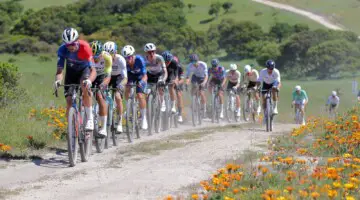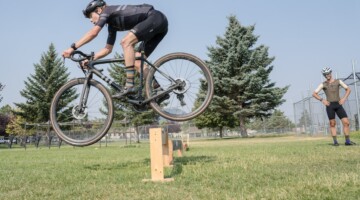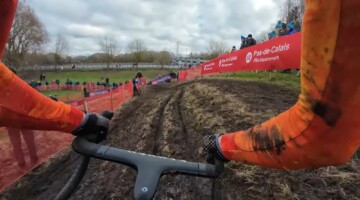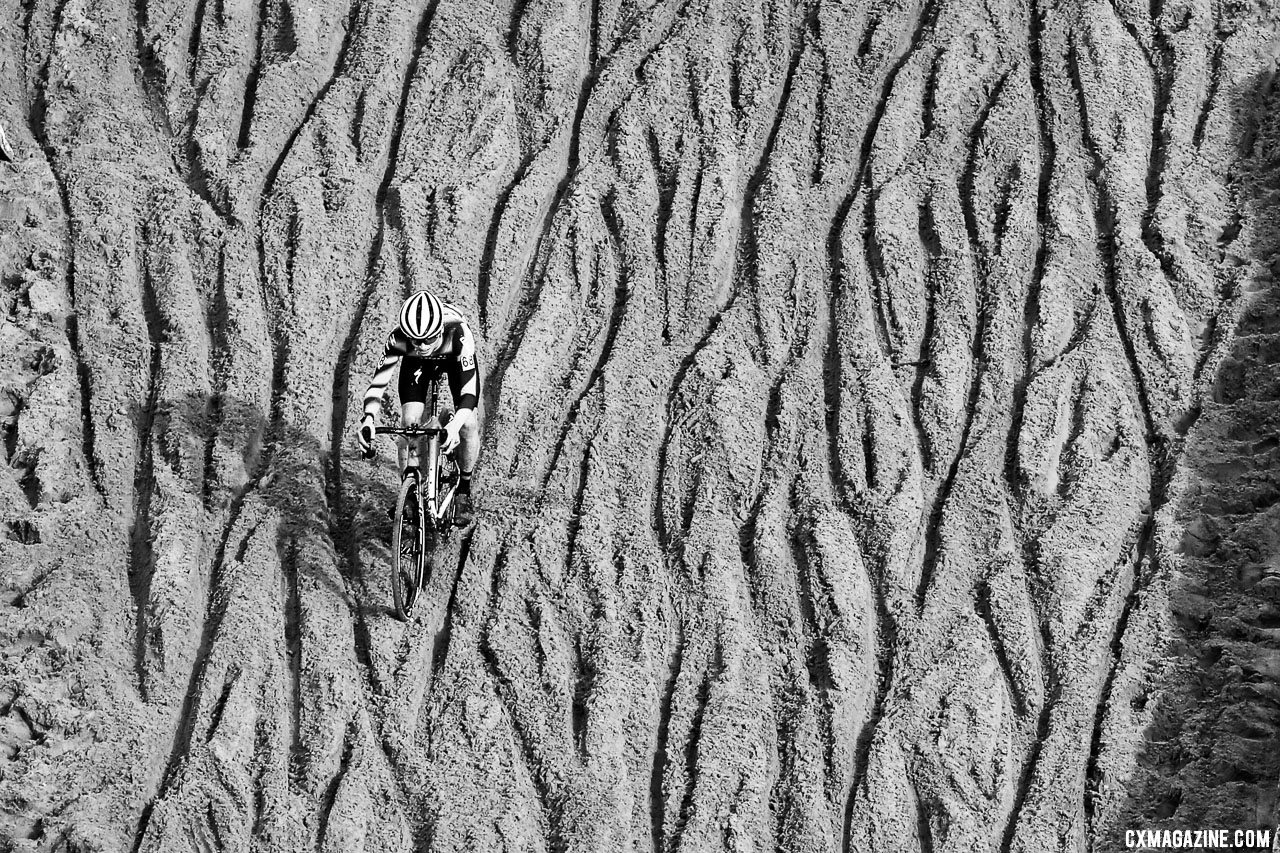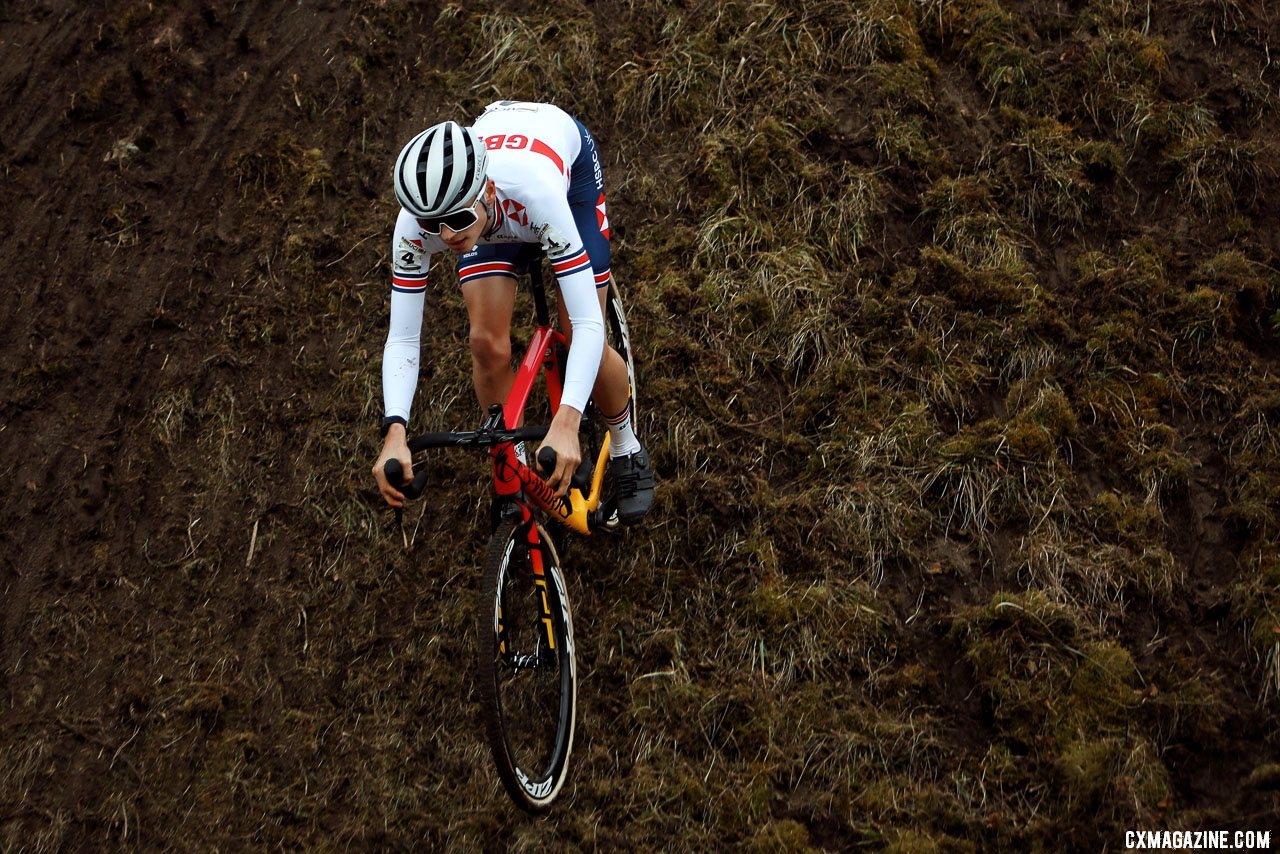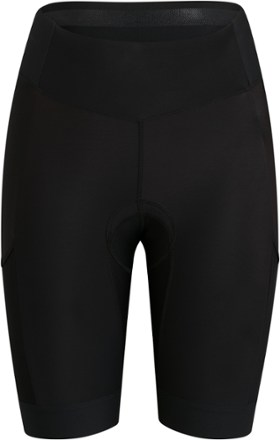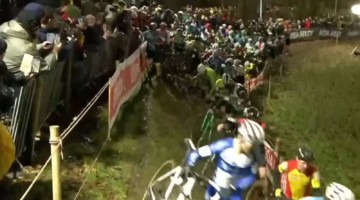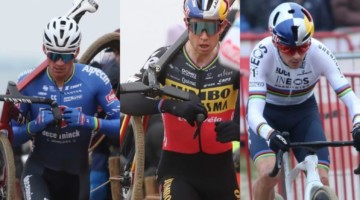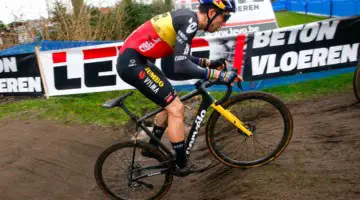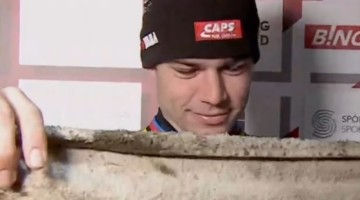Cameron Mason is a name to get to know if you don’t already recognize it. This Scottish U23 rider finished in the top-10 at last year’s World Championships. Equally compelling is the steady stream of content Mason produces for his YouTube channel. Get to know Mason, his team Trinity Racing and his progression from “mucking around in the car park” to establishing himself as a rising professional. This month, in the ongoing “How do the Pros Train” series, coach Corey Coogan Cisek heads east to catch up with Mason to learn more about his background and how he trains to compete with the best in the world.
Scottish rider Cameron Mason is an emerging talent on the UK and Belgian racing scene, but perhaps isn’t as well known by the Americans. A great way to get to know this athlete is via his prolific YouTube channel.
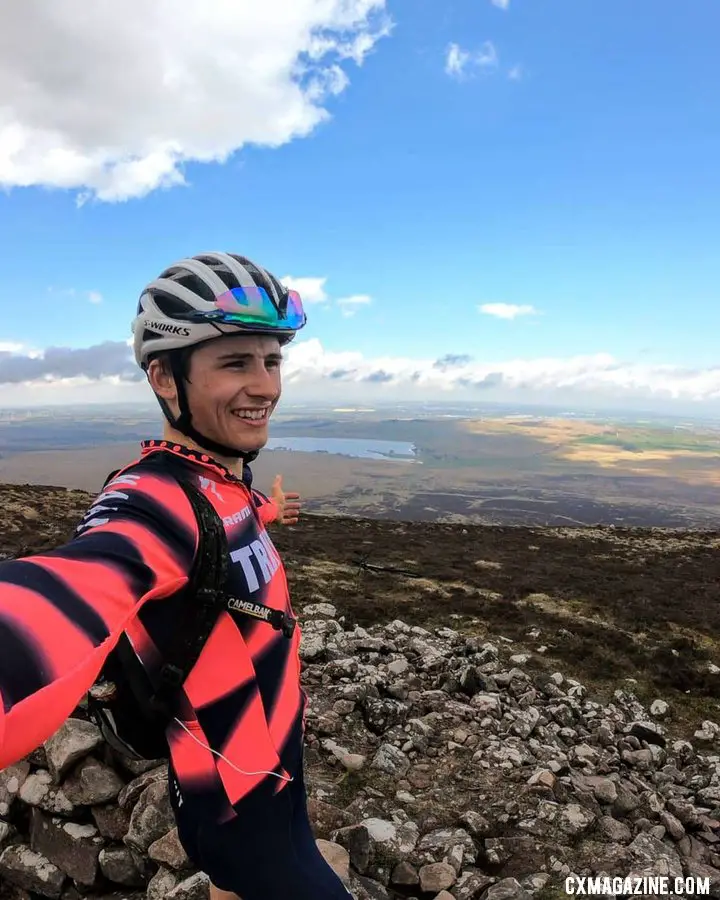
Scottish rising star Cameron Mason is looking forward to racing cyclocross again from his Belgium base. photo: courtesy
He’s been producing consistent video content since 2017–2018, the year he first got his feet wet (or rather dove into the deep end) racing in Belgium. The videos trace his evolution from a teen experiencing Belgian racing for the first time to pro racing for the UK UCI team Trinity Racing.
Trinity Racing is Tom Pidcock’s team. The team was originally established under the name Tom Pidcock Racing (TP Racing), as a platform to support Pidcock’s racing. For 2019–2020, it rebranded to Trinity Racing and added UK U23 riders Mason and Abby-Mae Parkinson to the roster.
For Mason, earning a spot on Trinity has been an amazing opportunity. During the season, Pidcock and Mason share a flat in Belgium, preventing the constant back-and-forth across the channel. Both Pidcock and Mason are coached by Trinity Team Manager Kurt Bogaerts, who owns The Breakaway, a cycling lodging, coaching, and support services business in Belgium. Bogaerts’ proximity during the winter is a boon to Pidcock and Mason. It allows them to motorpace and do weekly technical training as a team. “You always get more out of yourself when your coach is watching,” said Mason.
And then there’s the opportunity to train with Pidcock, 2020 Worlds silver medalist in the Elite Men’s race and former U23 World Champ and Junior World Champ. “Tom is a really good teammate,” said Mason. “Even though he’s just a year older than me, he’s pretty experienced in cyclocross. I managed to learn a lot from him and he’s obviously on a pretty impressive level.”
Since Bogaerts coaches both Pidcock and Mason, he can set up the athletes’ training so that it’s complementary. Mason clarified: “Tom has quite a few years of high-level training on me, so our training was quite different. I wasn’t doing a carbon copy of what he was doing because I would not have survived! It was tailored to me. Still, it was good to have a training partner.”
Trinity Racing is UK-based and licensed. Its cyclocrossers are British and riders and staff communicate in English, which helps Mason to feel more at home than if he were on a Belgian squad. Nevertheless, the team utilizes Belgian staff who are critical to its success. Belgian riders have an important “home field advantage” from having raced and trained the courses extensively. By the time a Belgian is a first-year U23, he may have raced the course four times via two years in nieuwelingen (age 15/16) and two more in junioren (age 17/18). The knowledge shared by Belgian mechanics helped Mason “catch up.” He recalled:
“The mechanics have been on the circuit for years and years. A lot of them raced when they were juniors and U23s in Belgium and raced World Cups. That really shows through when you arrive at a course and they know exactly what pressure you should have in your tires. You’re like, “Okay, fair enough. You know what you are doing.” Then you go ride it, and the pressure is pretty much exactly as you would have put it. That is massive for me. The majority of the races last year were brand new to me. It’s just one extra thing to chat with people about the course before racing. It makes it not as daunting.”
Mason’s 2019–2020 results were befitting of the support he received from Trinity Racing. After a solid block of Belgian Elite racing (six Elite races in a row in September and October), Mason broke through in the U23 race at World Cup Tabor, finishing 7th. He was then 8th in Nommay, 5th at Hoogerheide and 8th at Worlds. Important to note is that Mason is not yet 20 years old and thus has two more years remaining in U23s.
The Road to Trinity
We’ve acknowledged that Trinity has been a great opportunity for Mason, but how did he get there?
Like many kids, Mason was inspired to race by an older relative. He had a cousin in the South of England who raced bikes. When Mason was seven or eight and on a family holiday, he watched his cousin race. This inspired Mason to enter a “support race,” the Scottish term for a kid’s race at a larger adult event. Eventually, Mason’s family became regular attendees at the races, and he loved it, if not entirely for the racing:
At weekends, my family would go camping and go to these cross-country races. It would just be a whole fun weekend. The races would be ten to fifteen minutes long. You’d get super nervous and take it really seriously, but the majority of the weekend was spent mucking about with your friends in the car park. That’s why I enjoyed racing. It wasn’t for the race, but the social side of things.
Initially, Mason experienced success in the youngest age categories. “I had good skills and could just kind of weave my way around everyone,” said Mason.
Later, Mason experienced the struggle known to many a late-blooming male cyclist: his peers grew, but he did not. “In under-14 and under-16 junior categories, I kind of struggled,” said Mason. “I was tiny and had little thin legs and everyone shot up in front of me. That was a bit frustrating at the time, but I still enjoyed it. The enjoyment got me through.”
Mason has always raced mountain bikes and cyclocross, but he eventually evolved into more of a cyclocross racer. He didn’t make this decision as much as it was made for him by his talent. “It was never a definitive, ‘I’m gonna be a cyclocross racer.’ It was just, ‘I’m a little better at it. I’m going to put more into it,’” said Mason. “That little bit of extra focus was good for me because putting a bit more into it allowed me to get more out of it.”
Mason’s first foray into Belgian cyclocross was in fall 2017, during his last year as a junior. He was green and had very little idea of what he was getting into. “It was quite a sudden thing. I mean, well obviously, you just have to do it,” said Mason. “We were racing National Cyclocross Trophies, Great Britain’s national series) and hearing from other guys on the scene that Belgium is really where it’s at.”
For a Scottish rider, Belgium is quite a drive, yet a great deal easier to get to than for those of us who live on the other side of the pond. Mason borrowed a pit bike and he and his father set off to make a weekend of it, choosing to race Zonhoven, no less.
If you are unfamiliar with Zonhoven, know that it is an extremely technical course surrounded by the biggest of Belgian parties. Its defining feature is the De Kuhl, a sandpit drop and run-up, which makes for a natural amphitheater thronged with mostly inebriated spectators. The remainder of the course is nearly 100% sand and thus extremely taxing.
Zonhoven was eye-opening for Mason: “It was just me and my dad trying to work it out, trying to find sign-on, trying to do all the general things you have to do to get through a race. It was just diving into the deep end. As soon as you arrive, you go into the carpark and Sven Nys’ camper is there for Thibau, and you’re like, ‘Right, well, well this is the real deal. Let’s just give it what we’ve got.’”
Mason wasn’t put off by the experience. He recalls that he didn’t do particularly well, finishing midpack. “I had a few flurries of good riding, but just crashed a lot in the sand,” said Mason. “I had a good attitude, I was just like, ‘This is awesome, so much to learn.’ I was just amazed at the level of it all. I watched the Elite women. I watched the Elite men. I came away thinking: ‘Awesome. Let’s do this.’”
Mason returned to Belgium some weeks later to do the World Cup at Koksijde, another overwhelmingly difficult sand race. And then, clearly bitten by the Belgian cyclocross bug, he made a final trip over in February 2018 for Hoogstraten and Lille.
A 13th place in Hoogstraten gave Mason reason to believe he might be able to make it on the continent. “For a British rider, if you can get close to a top-10 in a Belgian race, I think people kind of start to notice you,” said Mason. “I tried to start to chat with Belgian teams and pro teams, but I realized that to break into the hierarchy of Belgian cyclocross, you really have to have star potential. You have to grab people’s attention. I just wasn’t quite that at the moment.”
Mason graduated high school in 2018, so the 2018–2019 season was an opportune time to devote himself to racing in Belgium. He recognized that he needed to elevate his riding to the next level if he hoped to eventually sign with a team. “My father and I took a step back and said, ‘What do I need to race in Belgium? I need equipment. I need a little bit of money. I need someplace to stay,’” said Mason. “There wasn’t really a set-up for that. There weren’t any UK teams. TP Racing was a thing, but I wasn’t really at a level where I could ride for them, so we created this kind of privateer setup around me.
In 2018–2019, as a first-year U23, Mason traveled to Belgium to race nearly every weekend. The transition from the junior to U23 ranks is a lofty one, but Mason and his dad “tried to chip away at it.” In time, Mason experienced success, earning both World Cup and World Championships selection. He finished top-30 at both the Hoogerheide World Cup and Bogense World Champs. From a distance, this might not seem like a great result, but it’s the top half of the field in a category in which Mason had three more years of age-eligibility. It was good enough to sign with Trinity Racing, an opportunity that launched his career.
Summer 2020: Plans Change
Trinity Racing launched a new road development team this spring of which both Pidcock and Mason would have been part. The plan was to do a U23 road calendar with stage races and kermesses. Unfortunately, even with the restart of racing, there hasn’t been much opportunity to race. Mason explained the dilemma: “The road calendar is almost up and running for pro riders, but U23, junior and development racing has been kind of shoved to the side because there’s no money in it. The people hit hardest are the second year juniors and the last year U23s who are aiming for pro contracts. It’s pretty unfortunate for them.”
Regardless of the status of road season, Mason had planned for a long rest block following cyclocross season: “I had about a month and a half off of training, really quite a long time off. The main thing was just to get away from it all and not really ride your bike if you don’t want to. I rode a bit, did some mountain biking and some bikepacking.”
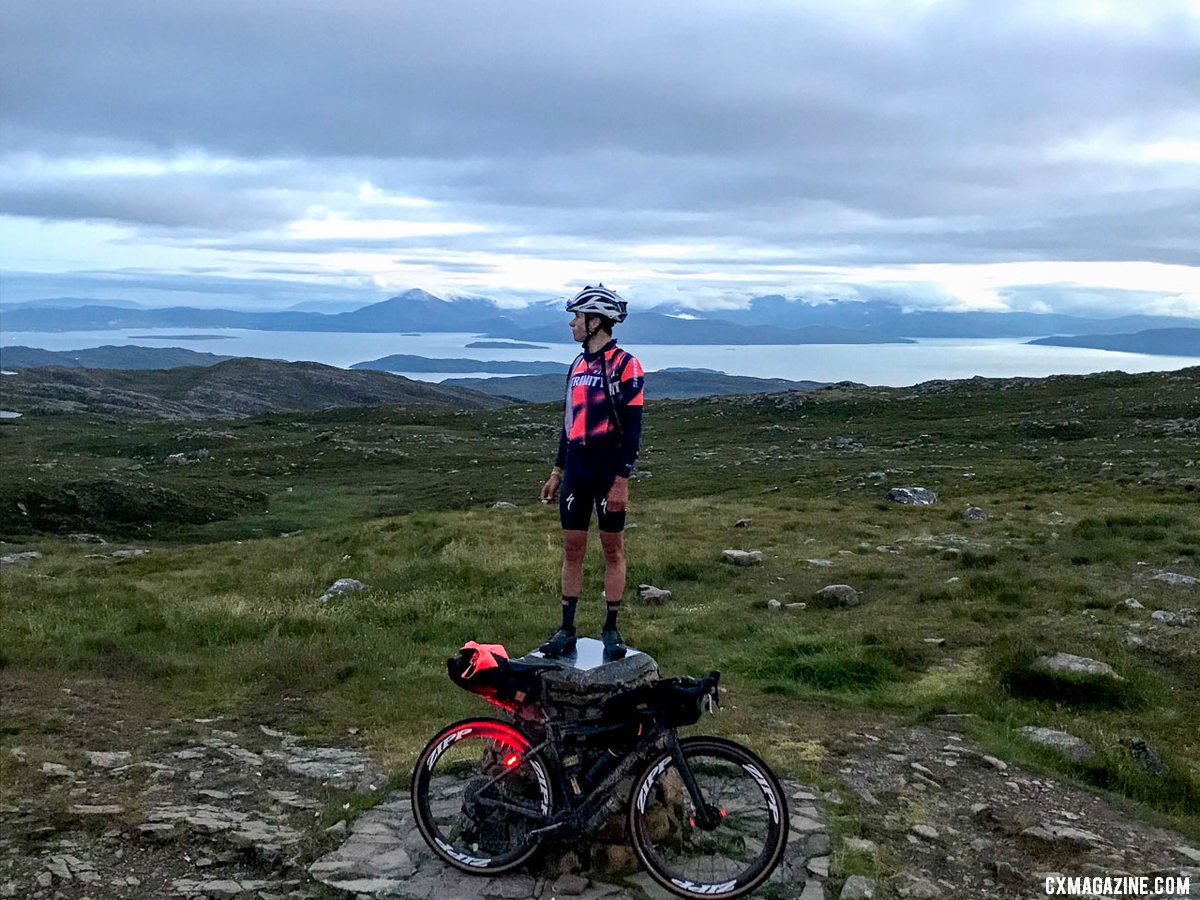
Scottish rising star Cameron Mason is looking forward to racing cyclocross again from his Belgium base. photo: courtesy
Mason restarted training in April, but with the recognition that road season was not going to happen any time soon. He started with a slow, patient build, including a fair amount of time on his mountain bike. “Mountain biking is, for me, quite a good way to get quality in,” said Mason. “I find you always have to keep the pressure on when mountain biking. You can’t just go for an easy four-hour ride like you can on a road bike.”
After this early build, Mason transitioned to structured training in a three weeks on, one week off block format. “Each block had a slightly different purpose,” said Mason. “The first few blocks were quite general, working on a lot of broad stuff, a lot of cadence work and overgeared stuff just to kind of replicate that gym work as well.”
Like most of us, Mason hasn’t been to an actual gym all summer. Scotland’s lockdown was significantly more strict than in the U.S. and even more so than in the rest of the UK. Gyms remain closed. Home gym bores Mason, but he gets the job done with core and resistance bands. He finds it far more interesting to accomplish much of his strength work on the bike. “The on-the-bike strength work is a lot of standing starts and overgeared work. I find that working at extremes of cadence helps me to produce power when I am at race cadence,” said Mason.
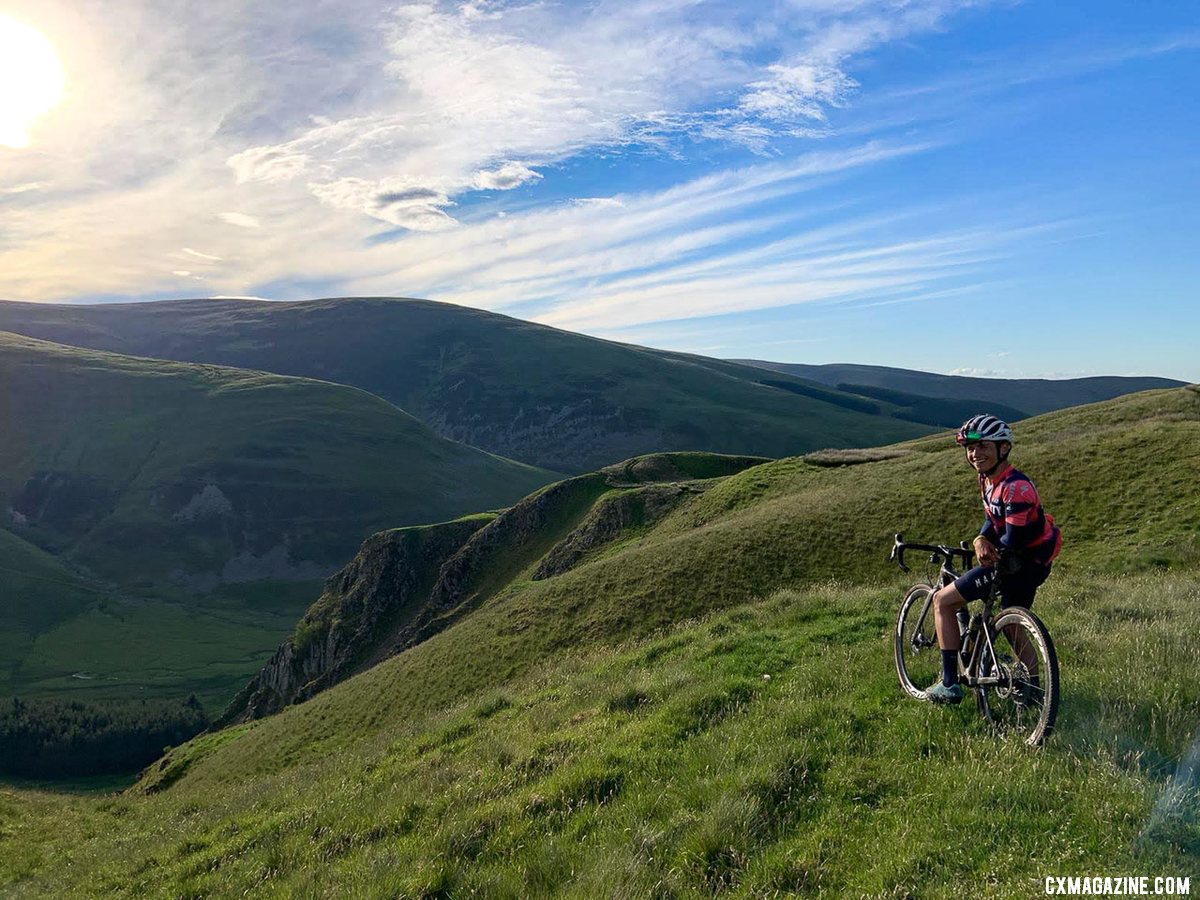
Scottish rising star Cameron Mason is looking forward to racing cyclocross again from his Belgium base. © Cyclocross Magazine
Mason runs regularly even though it’s not his favorite task. “I find running a bit boring compared to riding. When you get used to riding fast, running can be quite tedious,” said Mason. He usually runs about a half an hour twice a week at what he calls “a plodding pace.” Mason doesn’t do running intervals, saying that his running is just focused on staying loose and used to the running motion. As a pro, Mason accepts that running is effectively part of his job: “I’ve kind of learned to embrace it, just live life in the slow lane for half an hour and then it’s done.”
Looking forward to the season, Mason is keeping a careful watch on COVID-19 rates. He hopes to be able to start racing in early fall as the current UCI calendar suggests: “Whatever happens, I’ll be ready to race.”
Trinity Takeaways
Trinity Racing is providing its athletes with the means to succeed in Belgium. Its base in Belgium, the choice to use Belgian staff, and coach as Team Manager set-up provides optimal support. It is leveling the playing field for UK athletes racing in Belgium.
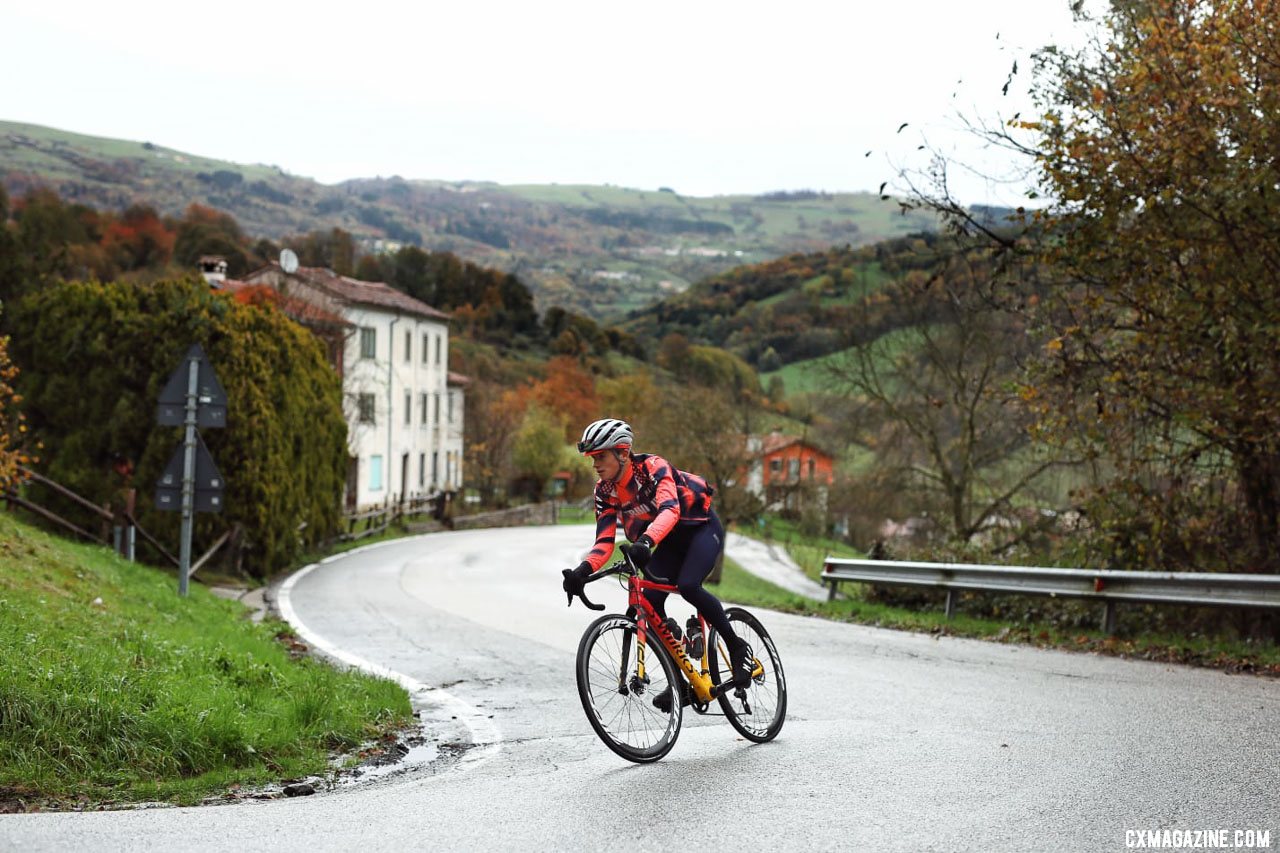
Scottish rising star Cameron Mason is looking forward to racing cyclocross again from his Belgium base. photo: courtesy
Pidcock has provided Mason with critical mentorship. Mentors are always important for development but probably all the more so within the difficult and insular Belgian cyclocross circuit.
A kid is more likely to fall in love with bike racing playing in the car park with friends than on the course. Don’t underestimate the importance of athletic friendships and having fun!
Many young men and women will go through phases where they can no longer keep up with their competition. Help them to continue to enjoy the sport while their bodies sort themselves out.
It’s a rare young adult who can handle “chipping away at it” in a foreign land with considerably less support than the locals. A rider who succeeds in these circumstances will almost certainly thrive when given proper support.
There’s more than one way to gain strength. While basic core, whole-body strength and mobility work are essential, specific strength can be built on the bike.
Corey Coogan Cisek is a Minneapolis-based cyclocross racer and coach who has spent much of her recent cyclocross seasons racing in Europe. Learn more about Corey at tripleccoach.com and read more How the Pros Train articles here.

